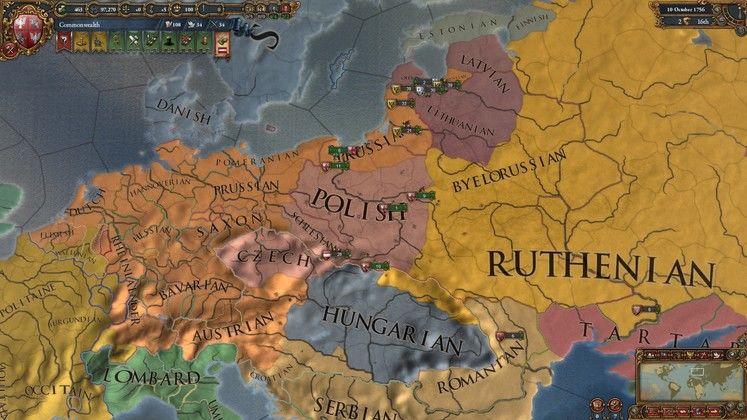Most playable countries won't feel the benefit of Res Publica's additional content, which is unsurprising given the focus on republic nations. In terms of new mechanics everyone can utilise; idea trees have been slightly reworked – for example there's now a military-focused 'naval' tree that's separate from the more mercantile 'maritime' branch – and a new national focus option allows you to tweak how many administration, military and diplomatic points your country generates. Another major change, hidden away in the small print, is that you can now diplomatically annex your vassals without requiring a royal marriage - that's a big deal, and makes controlling your holdings far easier, as previously it was an incredibly time-consuming and expensive process. That's pretty much it, aside from a few unique events.
 |
| There's plenty of flavourful new events and decisions for republic nations |
You'll get far more out of the experience if you decide to play as a republican dictatorship, the newly added government type. England under Oliver Cromwell is probably the best example of this, a nominally elective government which is in truth lead ruthlessly by just one man. In Res Publica you can decide whether to grasp as much power as possible at the risk of losing your republican tradition, or go the other route and slowly lose your total control. There's a bunch of unique events to go along with this option, and while it doesn't feel as dramatically different as some other forms of government, it does offer a few interesting choices and lots of flavour. It's almost a bit of a throwback to being an absolute bastard in CK2, although you never get quite the same sense of satisfaction when subjugating your fellow countrymen.
Merchant republics also have a few new tricks up their ornately embroidered sleeves. The biggest addition is the ability to set up trade posts in provinces outside your capital, which provides you with extra trading influence and more and more piles of filthy lucre. As a merchant republic you'll need to make certain that profitable yet vulnerable nodes outside of your area of influence are amply protected, because they'll now be your main money-making zones. If you like making quick cash this expansion will give you a few more ways to do it.
 |
| The mighty Netherlands continues to spread its influence across Europe |
A warning, however; merchant republics have had their overall trade power reduced in an accompanying 1.7 patch, but those powerful new trade posts are only available for those who own this expansion. The loss of a plus-ten bonus to trade power might not seem dramatic in most games, but this is EUIV, where every tiny percentage counts, and it will presumably make playing a merchant republic significantly harder without Res Publica. This marks one of the few times that Paradox's DLC model has felt at odds with those players who don't want to buy additional content.
Undoubtedly the new Dutch republics benefit most from the changes in Res Publica. Playing the Netherlands was always a challenge in core EUIV; a small Protestant nation in the middle of Catholic Europe, you had to be very careful about maintaining alliances and keeping a strong navy to discourage aggressive neighbours. Now it's an even more interesting experience. Two new factions have been introduced, the Statists and Orangists. The Statists are republicans who want the end of monarchic rule and the introduction of a true democratic state, while Orangists are loyalists who believe royal blood will lend the country the stability it needs. You constantly have to balance the advantages of each faction; when a new election comes around do you opt for a statist politician who will be up for re-election in a couple of years, or a typically more skilled Orangist candidate who won't relinquish his position?
 |
| Such is the focus on trade and merchant republics that Res Publica often feels awkwardly like an expansion to previous expansion Wealth of Nations |
There's a lot more to discover in an extended Netherlands campaign, and my relatively short run as ruler of the country was one of my more memorable EUIV games. I opted for a more liberal-minded republic that focused on trade and diplomacy, and the Orangists were a constant thorn in my side, with special characters like generals and administrators demanding I recognise their efforts with political rewards. It lends the country a distinct personality that is occasionally lacking in the sometimes dry history of EUIV.
EUROPA UNIVERSALIS IV: RES PUBLICA VERDICT
Aside from those enjoyable new Dutch republics, however, a lot of the new mechanics in Res Publica feels like content Paradox didn’t have time to slot into previous expansion Wealth of Nations, so it’s a little disappointing to see it jammed into another content pack rather than simply patched in. More options are never a bad thing, but when the new content is all jumbled up with the new Dutch options and other bits and pieces it leaves the expansion feeling more like a new patch than a product with its own identity. I’m slightly torn on this one, to be honest. The content added in Res Publica will undoubtedly improve your Europa Universalis IV experience, but unless you’re totally set on playing around with the new republic dictatorship options or as the enhanced Netherlands you won’t really get the most out of the new content. If you’ve got your heart set on a Dutch campaign then you’ll want to grab this expansion. Everyone else, even with that knock-down price, can safely give it a miss.
TOP GAME MOMENT
My entire Netherlands campaign, in which I had to deal not only with foreign threats but my own political instability, was a textbook example of how EUIV can turn a game of seemingly dry statistics and numbers into a compelling and unique story.




